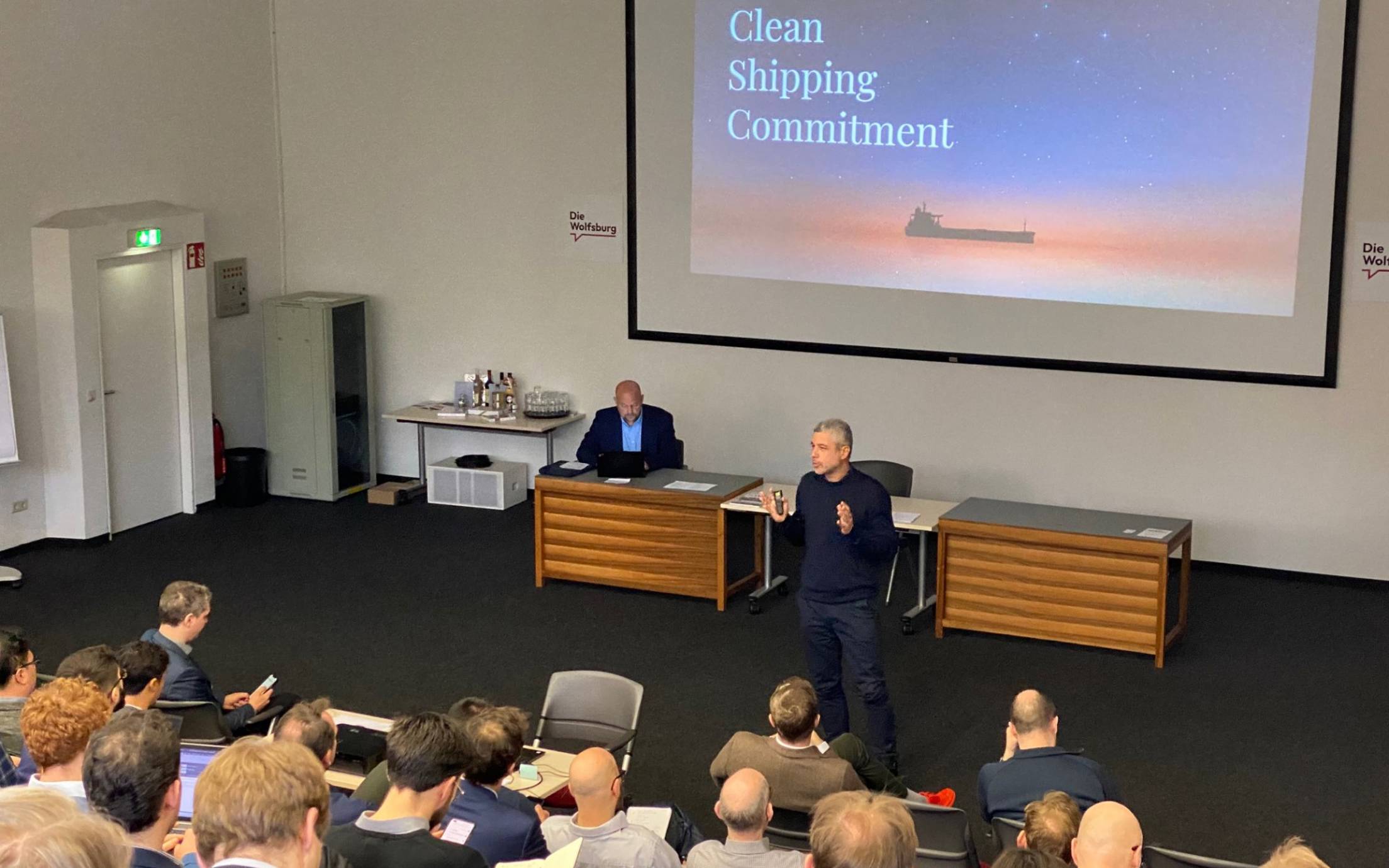At the event representatives from Jotun, Kongsberg Discovery, Bellona Foundation and the Research Council of Norway participated in the ‘Partnership & Innovation for the Green Transition in the Maritime Industry’.
As an introduction to the panel discussion, Irene Øvstebø Tvedten, Senior Advisor at the Bellona Foundation, set the scene by covering the impact of biofouling and how it can be combatted. Quoting an IMO (International Maritime Organization) study from 2020, she informed the audience biofouling accounts for 9% of emissions from global shipping. And according to the GloFouling (IMO) 2022 report, she added, even a slime layer can lead to 25% increase in greenhouse gas emissions, and that biofouling can also have a catastrophic impact on biodiversity, ecosystem health and the livelihoods of coastal communities across the globe.
Tvedten went on to say that those impacts could be reduced by proactive hull cleaning of micro-organisms and reactive hull cleaning with capture for macro-organisms, as recommended by the IMO’s recently revised biofouling management guidelines.
She also highlighted that “the current lacking and diverse regulations and biofouling management polices around the globe are causing confusion for ship operators”. Tvedten described how Bellona’s Clean Hull Initiative (CHI) is working to establish an internationally acknowledged best practice for hull cleaning, working with stakeholders in both the private and public sectors to develop an ISO standard for in-water proactive hull cleaning. She cited Jotun’s HullSkater as “one of the solutions that can lead to proactive hull cleaning becoming an established practice in global shipping,” and described proactive hull cleaning as a low hanging fruit for operators to improve their energy efficiency and environmental footprint.
Disruptive innovation
Morten Sten Johansen, Jotun’s Global Marketing Director, Hull Performance Category, was then asked how the idea for the Jotun HullSkater originated. He replied describing how the company has a history of aiding shipowners in their search for efficiency, cost saving and improved environmental performance and said that in 2016, the company came up with the idea of developing the robotic proactive hull cleaning device. “It’s disruptive innovation that fits perfectly with Jotun’s ambition and clean shipping commitment”.
Recognising that Jotun did not have the engineering experience to progress the concept, Johansen explained, “We took out a patent and then approached Semcon and Kongsberg as both are recognized experts in maritime and robotic technology. Later, we approached several other companies to be part of the collaboration, including DNV and Telenor, so we brought together specialized expertise from Norway’s maritime cluster to help develop the technology”.
Martin Wien Fjell, President of Kongsberg Discovery added, “When Jotun came to us with the idea of developing a robotic hull cleaning device, we thought it was very interesting and of course we were keen to be part of such a ground-breaking project. It covers our core technology areas and fits well with our green shipping strategy, which centres on developing solutions to provide best-in-class operational and efficiency gains for ship operators and sustainable oceans”.
Partnership “like a marriage”
Anders Hauberg Hemsøe, Global Program Manager, Hull Performance Category at Jotun, talked of the respect for each other and described the co-operation between Kongsberg and Jotun as being “something like a marriage”.
“It’s important that we share the same goals, ambition and an agreement to work together. Innovative technologies such as the Jotun HullSkater are no quick fixes and it’s not unusual to experience issues and uncertainties during the development phase. Mutual trust is very important in such situations, and we have worked together to resolve teething issues. It’s a very exciting project, there’s been a lot of learning and the partnership has succeeded in producing a reliable, high performance and sustainable solution for controlling underwater fouling. An extensive testing period has given us data that proves this point, and we are now aiming to scale up the use of the Jotun HullSkater in the industry,” said Hemsøe.
Representing the Research Council of Norway (RCN), which provided some of the funding for developing the Jotun HullSkater, Senior Advisor Kjell Røang said the status of the companies as leaders in their fields provided a good foundation. “It’s exciting to have two global industry leaders joining forces to develop the Jotun HullSkater. If widely adopted, it could represent a real change in the industry and help combat the global biofouling issue”.
Asked about the basis for funding the project Røang explained, “If we think of an innovation project like this one, then it must generate something that is new and useful. In addition to providing value for the companies involved, it should ideally solve a societal issue. And like in this project, it should have the right partners and solid plan to ensure proper development and implementation”.
Johansen and Fjell both made the point that Jotun and Kongsberg are investing considerable resources and finances into the project and the funding from RCN was a useful incentive for persuading stakeholders and executives to continue investment. Kjell Gjestad, Senior Vice President – Vessel Robotics at Kongsberg Discovery, added that the funding can also be used to engage specialists from other companies that can contribute to the project.
Commenting on whether six years was a long development period, Gjestad said, “It is important to remember it was a product that didn’t exist before, there was no market knowledge, no technical solutions so we were working from scratch”. He also emphasized the technology developed and integrated for the Jotun HullSkater is state-of-the-art. “To validate the technology, we have collaborated with other specialists, as well as shipping companies. They have helped to further develop and refine it. Going forward an increasing number of operators are anticipated to seek proactive solutions that can safeguard both their vessels and the environment”.
Good business case
Commenting on the return-on-investment aspect, Johansen firmly believes there is a good business case for the ship operator. “They save costs in terms of fuel and become more operationally efficient at a time when the entire industry is grappling with new regulatory measures. We also see operators becoming more interested in ESG as cargo owners and end-users are also driving for more sustainable transportation”, he said.
Fjell agreed saying, “The use of new tech such as the Jotun HullSkater should not mean things will be more expensive for the end user. What it means is the ship operators shall reduce fuel use, and they will get a return on investment. Making the investment now will also help them transition to greener, more sustainable operations. Put simply, it’s good for business and the environment”.
Asked to expand upon the regulations around biofouling, Tvedten said that the lack of international regulations on hull cleaning makes the process of promoting frequent and safe hull cleaning challenging. She said the IMO is known for its slow pace but underlined the IMO’s recently revised guidelines on biofouling management is a step in the right direction. There are also other positive moves with industry collaborations and alliances working together, sharing knowledge and best practices in an effort to achieve greener shipping and cleaner waters. “But we need to do more, both when it comes to technology development and regulations – we need to move faster to make shipping more sustainable,” urged the senior advisor at Bellona.
Need to create more awareness
Tvedten added that most ship owners are not aware of how biofouling impacts performance and damages biodiversity. Despite the media communications on the urgency of the issue, “the level of knowledge within the industry is not high and there is a need to generate more awareness on the impact of biofouling and the solutions to combat it”.
Johansen concurred saying a recent Jotun survey revealed almost 60% of owners underestimate the impact of biofouling. He praised Bellona and the CHI partners for their efforts to develop an ISO standard for in-water proactive cleaning. “The work is ongoing and industry wide participation, including ports and regulators, is important to make sure the standard is accepted and adopted to the widest extent possible”.
The panelists agreed the economic and environmental impact of fouling, combined with the stricter environmental regulations, are likely to lead to more operators seeking new ways to improve hull performance. “There is a lot of talk about alternative fuels and the role they will play in shipping’s low-carbon future, but it is also important to focus on the low hanging fruit,” said Johansen and added, “Hull performance, and the hardware that keeps them clean, will continue to be a critical driver for efficiency gains for ships – and protecting the environment.”
Significant market potential
Fjell added, “We believe there is a significant market potential for the Jotun HullSkater. And we have a good starting point since Kongsberg works with a large portfolio of ship operators and Jotun has a 25% market share too. That’s a relatively strong platform so when we join forces, together with the authorities and other stakeholders in Norway’s maritime cluster, then we are in a stronger position to tackle the biofouling issue and help the green transition in the maritime sector”.
In her closing remarks, Charlotte Gjone, Senior Communication Manager and Public Affairs at Kongsberg Discovery, emphasized the biofouling challenges are by no means insignificant and praised the role that partnerships and innovative technology are playing to enable the greening of the shipping industry.
“The Kongsberg Agenda event is Norway’s most important meeting place for everyone with a heart for technology, industry, business and protecting the environment,” said Gjone and added, “The panel talks addressed all these aspects and, in particular, shed light on how industry collaboration enables reduction of environmental impact in the maritime industry. Clearly, there still much to do but it’s welcome that a progressive group of Norwegian companies, together with the national authorities, are working together to solve the global fouling issue”.
“The answer to solving the issue is more collaboration and disruptive innovation,” said Johansen and concluded, “By taking a united approach and enabling the use of our proactive Hull Skating Solutions for fouling prevention, we all contribute to helping ship operators reduce emissions, preserve fuel and protect the ocean’s biodiversity”.




